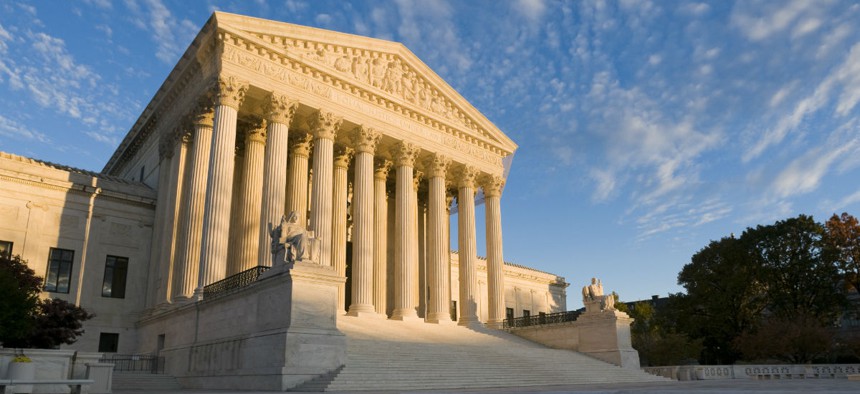
Gary Blakeley/Shutterstock.com
Maybe the Supreme Court Shouldn’t Police Itself on Financial Disclosure
Watchdog group wants to expand the STOCK Act.
When President Obama signed the 2012 STOCK Act, he and Congress imposed new financial transaction disclosure requirements on top people in the legislative and executive branch. The law—opposed as intrusive by many in the senior executive service—conspicuously does not apply to the nine justices on the U.S. Supreme Court.
That ought to change, in the view of the nonprofit Center for Effective Government.
“Judges are supposed to recuse themselves from cases in which they have a conflict of interest,” wrote Scott Klinger, director of revenue and spending policies for the center formerly known as OMB Watch. “But because of outdated disclosure standards in our nation’s court system, the public too often lacks the information necessary to make sure that potential conflicts are appropriately dealt with,” he noted in a blogpost calling for greater transparency at the high court.
“Unlike Congress and the executive branch, each of which have independent arms to oversee and monitor the financial disclosure process, the Supreme Court polices itself on financial disclosure,” he wrote.
He cites studies by the advocacy group Fix the Court and the investigative group called the Center for Public Integrity that suggest a pattern in which some justices and appeals court judges sided in cases involving corporations in which they hold stock, or failed to recuse themselves.
The Supremes also make it tough on journalists and transparency specialists to promptly access what little financial information the Justices do provide. “Both Congress and the executive branch make financial disclosure forms available electronically (Congress online, and the executive branch in response to a webform request), generally within a few days of when they are filed,” Klinger writes. “The Supreme Court, however, remains stuck in the 20th century, requiring inquirers to fill out a form requesting the information and then waiting for it to be processed. Once the request is filled, the person must make an appointment to physically pick up the information at the Court in Washington D.C. and bring a check to pay for the 20-cent-a-page printing costs.”
What’s more, the court keeps past disclosure documents for only six years rather than indefinitely like the other branches.
The reforms proposed by Fix the Court include:
- Expanding the STOCK Act to Supreme Court justices and other federal judges;
- Requiring the justices to place their financial investments in a blind trust;
- Requiring financial statements of the justices and federal judges to be posted online within days after the documents are filed;
- Requiring the highest court in the land to form “an independent body to administer a code of ethics and disclosure practices consistent with those already in place in the other two branches of government.”
(Image via Gary Blakeley/Shutterstock.com)







